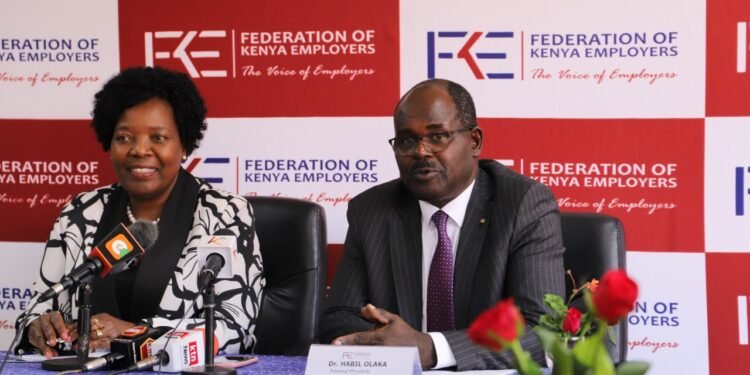Why Bosses Are Against Bill Barring Them From Calling Staff After Work Hours
Olaka further feared that the amendment would complicate the relationship between employers and workers given that the proposal may be turned into a weapon by the employees.

The Federation of Kenyan Employers(FKE) led by their President Dr. Habil Olaka on Friday, September 15 opposed a proposed Bill seeking to make employers calling their employees after working hours a criminal offence.
Speaking during a press conference, Olaka termed the Bill as retrogressive given that it was threatening to damage the lifespan of companies and defy the realities that a workplace has each and every single weekday.
Olaka further feared that the amendment would complicate the relationship between employers and workers given that the proposal may be turned into a weapon by the employees.

FKE CEO Jacqueline Mugo (left) and National FKE President Dr. Habil Olaka (right). /FEDERATION OF KENYA EMPLOYERS
"In essence, the Bill seeks to establish the right of an employee not to be contacted by the employer beyond the contracted working hours unless it is an emergency. FKE does not support the proposed Employment Amendment bill, 2022 because; the amendments introduce radical and stringent measures that will curtail the employer's prerogative to manage enterprises and pose,” criticised Olaka.
He added: “These proposed changes negate the essence of freedom and the realities of the labour market.”
Furthermore, Olaka stated that the new provisions would put a potent strain on an employer's prerogative to manage their enterprises and present challenges to industrial relations in Kenya.
If passed, the FKE boss pointed out that the Bill would create two centres of managerial power and ultimately cause “disharmony and indiscipline” in workplaces.
“If the nature of the business requires a shift system or extension of working time to meet the workplace demand then such laws which are prescriptive in nature will hamper flexibility in work arrangements,” he went on.
Olaka further highlighted the effectiveness of existing International Labour Organization (ILO) instruments in managing working hours and overtime payment, expressing reservations about the Bill's true intentions and its requirement for employers to regulate employee phone usage outside work hours.
He thus advocated for a mutual agreement between employers and employees on work arrangements that suit their needs.
Moreover, Olaka raised concerns that the bill could interfere with effective responses to emerging challenges such as the COVID-19 pandemic and the blended office, or hybrid, where workers can work from anywhere.
“The engagement between an employee and employer during and out of work hours is a management issue and should not be legislated,” he complained.
Olaka called on policymakers to shift their focus from the proposed amendment and instead consider comprehensive reviews of labour laws. He stressed the need to address emerging issues through a holistic approach that benefits all stakeholders involved in the labour sector.
On January 25, 2023, Nandi Senator Samson Cherargei introduced the Employment (Amendment) Bill, 2022 which sought to impose a heavy Ksh500,000 fine on employers or a one-year jail term, or both in the event they call them outside regular working hours.
The Bill sought to amend Section 27 of the Employment Act, 2007 to introduce ‘the right to disconnect’ by employees, effectively giving workers the power to ignore work-related calls, messages and emails during out-of-work hours.
It also pushed for employers to put in place a policy to explain circumstances when they may contact employees during out-of-work hours and specify the nature of compensation for employees who work beyond the regular working hours.
The bill also sought to bar punishment by employers on employees who fail to heed to their demands of working overtime.







